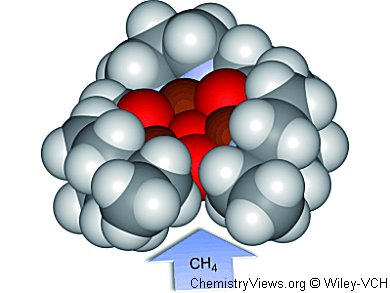Methane oxidation is extremely difficult chemistry to perform in the laboratory, as the C–H bond in CH4 has the highest bond energy amongst organic substrates. With a turnover frequency approaching 1 s–1, the enzyme methane monooxygenase (pMMO) is the most efficient methane oxidizer discovered to date. Given the current interest in developing a laboratory catalyst suitable for the conversion of methane to methanol on an industrial scale, there is strong interest to understand how pMMO works and to develop functional biomimetics of this enzyme.
Inspired by the proposal that the catalytic site might be a tricopper cluster, Sunney I. Chan, Academia Sinica Nankang, Taipei, Taiwan, Michael K. Chan, Ohio State University, Columbus, OH, USA, and colleagues have recently developed a series of tricopper complexes that are capable of supporting facile catalytic oxidation of hydrocarbons. They show that two tricopper complexes that are capable of facile conversion of methane to methanol: a tricopper-peptide complex derived from pMMO and a biomimetic model tricopper complex.
The biomimetic tricopper complex oxidizes methane efficiently at room temperature and can be formulated either as a homogeneous or heterogeneous catalyst. It is a functional catalyst based on the physicochemical principles acquired from understanding the structure and reactivity of the putative tricopper cluster in the copper monooxygenase.
- Efficient Oxidation of Methane to Methanol by Dioxygen Mediated by Tricopper Clusters,
Sunney I. Chan, Yu-Jhang Lu, Penumaka Nagababu, Suman Maji, Mu-Cheng Hung, Marianne M. Lee, I-Jui Hsu, Pham Dinh Minh, Jeff C.-H. Lai, Kok Yoah Ng, Sridevi Ramalingam, Steve S.-F. Yu, Michael K. Chan,
Angew. Chem. Int. Ed. 2013.
DOI: 10.1002/anie.201209846



